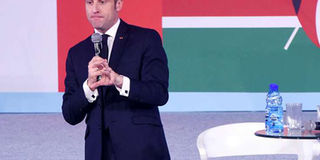Presidents should be 60 years or less

France President Emmanuel Macron in a session with students at the University of Nairobi on March 14, 2019. PHOTO | DIANA NGILA | NATION MEDIA GROUP
What you need to know:
- President Macron came to the level of our university students and the rest of us when interacting with that community.
- The students did not thus feel intimidated when asking him questions. The main things he talked about were of course of major interest to all of us.
Last Thursday, we at the University of Nairobi had the honour of hosting the French President Emanuel Macron.
Listening to him talk and answer questions from our students reminded me of an event we had at the university a few years ago. It was at our Upper Kabete Campus where the Wangari Maathai Institute for Peace and Environmental Studies is located.
President Uhuru Kenyatta was the main guest at that occasion and his main brief was laying the foundation stone of that institute.
After the main event, we had organised an interactive session between the President and his ministers who were with him and our students in one of our lecture theatres.
It was a major experience. The interaction went so well because the President came down to the level of the students.
AGE LIMIT
So when I listened to President Macron on Thursday last week, I got this feeling that leaders of the world in this 21st century should not be more than 60 years-old. Of course, they will need the wisdom of older people but they must be the flag bearers.
At our event on Thursday, President Macron came to the level of our university students and the rest of us when interacting with that community.
The students did not thus feel intimidated when asking him questions. The main things he talked about were of course of major interest to all of us.
They include partnerships and exchange programmes between Kenyan and French universities. President Macron also shared his experience in west Africa when he started his civil service career 20 years ago.
DETERMINED
He showed his interest in this matter by talking about his commitment to Africa. That commitment came across as real and from a man who wants to get it done.
He also gave it a flavour by insisting that Africa and France should engage as equal partners. But the experience we have is of richer countries trying to patronise poor nations that are less endowed.
Incidentally — while he did not mention it during his delivery at this occasion — I remembered a remark he had made some days ago about Africa’s relationship with China.
I think that is something we need to ponder about as a country in light of what is happening in Kenya.
HEGEMONY
Colonisation was about owning the minds of Africans — or others. The first step was to deprive such people of their culture, starting with language, religion, symbolic forms and so forth.
The expansion that China is involved in around Africa should worry some people.
They may be doing something positive by building infrastructure, but we must also examine their effect on our culture. What other aims might they have?
Father Dominic Wamugunda is the Dean of Students and a Lecturer of Sociology at the University of Nairobi.





